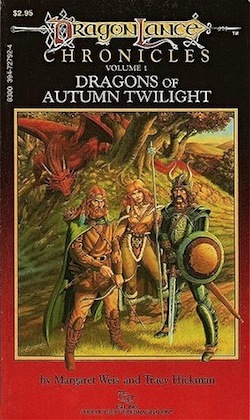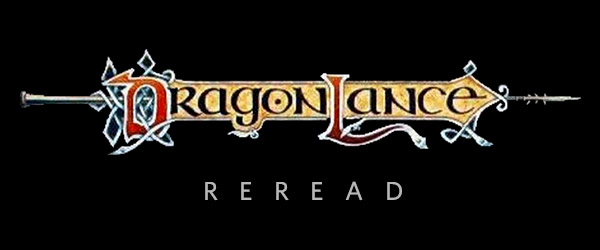Welcome to the very first week of our reread of the Dragonlance Chronicles by Tracy Hickman and Margaret Weis. The Chronicles—Dragons of Autumn Twilight (1984), Dragons of Winter Night (1985), Dragons of Spring Dawning (1985)—were originally published by TSR. They are tie-in fiction, but more than that—the Chronicles were written in parallel to, and by the same creative team as, a series of Advanced Dungeons & Dragons adventure modules. They’re not novelisations of the adventure as much as they are the world bible and underpinning and overarching story.
As well as (many) modules in (many) editions of Dungeons & Dragons, the Dragonlance setting grew to inspire computer games, board games, card games, and a movie that is better left unmentioned. And, of course, almost 200 novels, written by Weis, Hickman, and dozens of others. Not only is Dragonlance one of the most successful shared worlds in fantasy, it is also one of the most popular—influencing generations of fans and writers alike.
Over the next… counts on fingers… million weeks, we are going to poke and prod at these three fascinating, important, influential and really, really fun books, one chapter at a time. We’ll also take a few side-quests to talk about the history of these books, have chats with contemporary authors about Dragonlance, watch that terrible movie (argh) and maybe even play a game or two. Stick with us—Krynn won’t save itself!
“Canticle of the Dragon” and “The Old Man”

We start Dragons of Autumn Twilight with two (very) short chapters: “Canticle of the Dragon” and “The Old Man.”
“Canticle of the Dragon” is actually, er, a poem. And not even by Weis or Hickman—the poetic contributions to the initial series came from Michael Williams. “Canticle” is an impressively concise history of the world of Krynn.
It begins in “ages” deep, describing the world and its three moons and—you’ll hear this word a lot—dragons. Dragons, dragons, dragons. In case you forget what sort of lance-book you picked up, the first two stanzas of the series use the word “dragon” five times. Anyway, the poem begins with the Age of Dreams, and times are rough—dragons are making war (on one another). Then a knight, Huma, with the aid of the gods, wields the first Dragonlance and starts winning for the side of good. With help from Paladine (the big Good God), Huma banishes the Queen of Darkness (the big Evil Goddess) and her ‘shrieking hosts’.
Next up, Age of Might. The empire of Istar arises, and the “long summers of good”. But the Kingpriest of Istar gets a little, well… troublesome… and in his attempt to “purge the world of sin” tries to summon the gods, and pisses them off instead. Enter: “a mountain of fire” (known as the Cataclysm), and the world is radically reshaped—and not in a pleasant way.
Finally, the Age of Despair. The old gods have lost their power, the face of the world has changed and the survivors of the Cataclysm have fled the “hulks of cities”.
And this is where our story begins… Except not quite. With the scene set in such a grand way, we now focus in on the utterly prosaic with “The Old Man”. This prelude chapter begins with Tika Waylan working at the Inn of the Last Home. The Inn is based in the small town of Solace, and like the rest of the town, is build high in the branches of a gigantic vallenwood tree. After the Cataclysm, the townfolk decided they’d be happier up in the air, and now, centuries later, they’ve built a tidy little arboreal culture.
For Tika and Otik (the innkeeper), this is another ordinary day. As the two fuss about, straightening up for the evening crowd, they do a bit of handy infodumping. Solace is tense—the town seems to be ruled by a ‘Theocrat’ and the Seeker guards. Otik is pretty snooty about this local militia, but Tika is worried by rumors of war. Also, strangers. Hooded strangers. The worst type.
Their gossip is interrupted by a mysterious old man in a gray robe. Although he sounds scattered, the man seems quite together—and much to Tika’s shock, he starts rearranging the furniture. Is he throwing a party? Is he slightly senile? Is he a powerful sorcerer with precognitive abilities? WE MAY NEVER KNOW.
(I bet we will)
Notable Quotes
“Dragons, terrible and great, made war on this world of Krynn”
I like the wordplay with both terrible and great here. The “Canticle” isn’t shy about using the words “good” and “evil,” but this adds a little more variety. Also, both words kind of mean the opposite, which is sneaky—“terrible” as in “awe-inspiring” [adding to the ‘good] and “great” as in “really very large” [to the ‘evil’]. Also “made war on” makes it sound like they are fighting one another… and the world itself. The impact from these awe-inspiring, very, very large creatures is taking its toll on the land itself.
“It will be a party such as the world of Krynn has not seen since before the Cataclysm!”
This is the old man’s response to Tika’s question about the furniture shuffling. It represents his (dark?) humour and, of course, sets up the Vast Importance of the things that are about to occur in the next chapter. This is also one of the two references to “since the Cataclysm” in this short chapter. One of our handy sourcebooks helps us date the Cataclysm to 348 years before the events of this book, so we can kind of infer that not a lot has happened since then.
Monster of the Week
DRAGONS!
A great galloping “shrieking host” of them. They’re “unspeakable” and “coiling” and “terrible” and “great” and they have wings and throats and presumably other body parts as well. Granted, our first and only monsters so far are in the intro poetry, but, hey—they’re dragons. We’ll take ‘em however we can get ‘em.
Jared’s Take
Every week we’ll also put in our own two cents. The person who writes the week’s recap gets to go first. This week, that’s me!
These two micro-chapters are the Chronicles in a microcosm. We’ve got the sweeping scale, the inventive approach, the epic tension… and also some ridiculous (and occasionally self-aware) cliché. How can a series this creative also be so clunky?
I’ll admit that I’ve read the Chronicles a dozen times, but I’ve never paid much attention to the poetry. It is a quick and useful way to boil down an epic background (much of which isn’t actually relevant) into a few short pages. Granted, it uses the word “dragon” five times, it doesn’t rhyme, and it uses anachronistic words like “sin” and is possibly written by a narrator that couldn’t exist within the world it describes, BUT STILL… very handy.
“Canticle” also does a good job of boiling down one of those things that makes Dragonlance so special. The conventional epic has already happened: evil was ruling the world, then good skewered it with a pointy object. (See: most fantasy.) But then, the revisionist epic happened as well: good ruled the world and botched the job. The “Age of Despair” is an open playing field—evil’s had a shot, good’s had a shot… now the god’s have taken their toys and gone home. In a purely Hegelian way (pretension alert!), we’ve had thesis, antithesis and are now in some sort of interesting new synthesis. Go Chronicles!
And then… we start at the Inn with a ridiculous barmaid (19 years old and letting Otik “pat her cheek and tweak her red curls”?! Really?!) and a Wise Old Man staggering in—hood and all—to push the plot together. The Annotated Chronicles, which I’ll be referencing occasionally to make me sound well-researched, has a note from Hickman saying that this was a deliberate reference to D&D games, as starting off in an inn was already a cliché for role-playing games.
So what’s that mean? In any other book, I’d immediately call this out as ungood writery. But Dragonlance is a special case, and probably deserves more consideration. First, we have Hickman’s note. So maybe some of the awkwardness is actually tongue-in-cheek? And second, we have Dragonlance’s unusual origin—books and modules written in parallel. How much of the clunkiness is because the books are being ‘railroaded’ by the necessities of the game?
And, most importantly, where does this leave us, as readers? Does authorial intent count? Basically, when the writing is… well… bad… how much are we allowed to blame everything but the text itself? This may become a recurring theme.
Mahvesh’s Take
It’s interesting to have found out many years later that the books were tied into a larger universe of gaming modules—as a kid living in Karachi in the dark days before the internet and finding the Chronicles in second hand book stalls, I had no idea that there was any more to these stories than what I was reading. The books were the entire canon, as it were, and if there was clunkiness then well, it was just clunkiness. As for the cliches that existed in RPGs at that time—I didn’t even know what RPGs were! I haven’t read these stories for over 20 years—maybe more—and this is the first time I will read them knowing that they tied in with other modules. So forgive me for blaming the text itself when it is bad, or questioning when it is so because of another storytelling model.
Having said that, wow—was the writing always this awkward? Jared pointed this out about a year or so ago and I didn’t want to accept it but it’s true. The first two chapters encapsulate a great deal of what we’ll be seeing in the future: all the things that make Dragonlance special, as Jared said above, and also a lot of exclamation marks, a great deal of exposition and so much painfully detailed description. Everything that I probably loved as a teen, I bet.
But what I still like about these first two chapters is how they set us up to the wide open possibilities—again, when all you know are the books, you never consider starting off at an inn a cliche or something that happens in D&D (news to me!). The inn of becomes hearth and heart of the adventurers and a place where much information is released to the listener—I suppose that’s how it works in the games too. It’s a home base, a familiar safe spot—a warm room with a roaring fire, food, drink and friends. Everyone can relate to that, even if you live in a city where you didn’t really need a heater, let alone a fireplace. Such exotic appeal—a fireplace!
What I like especially about these ‘micro-cosmic’ chapters is the wide openness of things, the limitless possibilities of things to come. “Canticle” tells us,
we called to the blank sky
into the cold, dividing gray to the ears of new gods.
The sky calm, silent, unmoving.
We have yet to hear their answer.”
We know that we are awaiting something—something massive, important and potentially life altering. The sky is calm, still and so wide open to potential—potential dragons, gods, directions for lives to take. This is what we all loved about Dragonlance—anything could happen and everything that did would be an adventure.
Of course, now that I think about it, it was all about the random roll of dice, wasn’t it?
Onwards!
Mahvesh loves dystopian fiction & appropriately lives in Karachi, Pakistan. She writes about stories & interviews writers the Tor.com podcast Midnight in Karachi when not wasting much too much time on Twitter.
Jared Shurin is an editor for Pornokitsch and the non-profit publisher Jurassic London.










